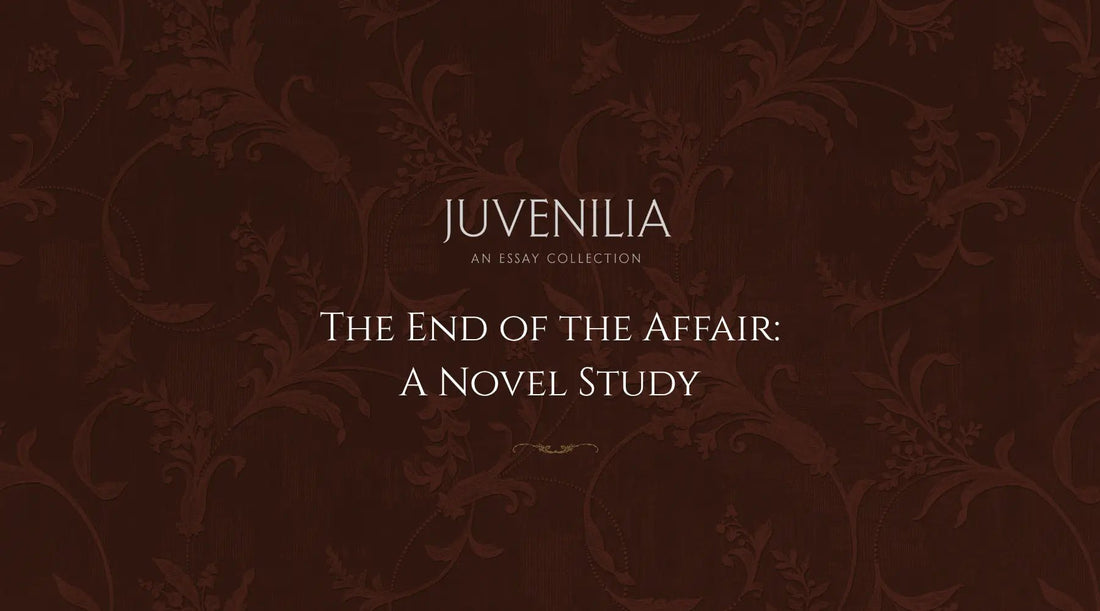
The End of the Affair - A Novel Study
Maurice Bendrix, the protagonist of The End of the Affair by Graham Greene, is a man who is ruled by his emotions. Bendrix wields his pain as a weapon and allows his pain to turn into hatred, manifesting itself in malicious, jealous, untrusting, and apathetic ways. He lacks emotional intelligence, and his jealousy and passion render him unable to truly love out of fear of not being good enough. He is very emotional and turbulent, and quite unsure of himself. His doubts impede on his work and relationships in devastating ways, and he allows himself to become bitter, and in the end it's his tragedy.
Despite his negative qualities, he is not a bad man: Bendrix simply makes all the wrong choices. Sarah Miles, on the other hand, is a rational woman who does not allow emotions to control her. She is capable of loving to the full extent, is truthful, genuine, well liked, keeps her promises, and strives to be a good person. She, despite having been through an affair, acknowledges her own shortcomings and finds peace in God when she feels lost and unloved. These characters stand on very different moral grounds, but they are both people who only wish to be loved.
"Where do you see this lovely thing in me? (...) You can find it in Maurice, who thinks he hates, and loves, loves all the time. Even his enemies." (Greene, 120)
Bendrix is not truly a hateful person. In fact, quite the opposite is true. He has a lot of potential for loving others, but he is possessive and jealous to the point that if the love cannot be solely his, it does not count. This is a very problematic way of looking at love, and it is not fulfilling. A direct result of this mindset is his belief that Sarah does not love him truly. Even after being constantly reminded of her love, he does not allow himself to belief the truth of it, and it sends him spiralling into despair, especially when Sarah leaves him without explaining herself, (not that she should have to).
Instead of allowing himself to feel pain, he spins it and redirects it, projecting his own mistrust into the world and wishing pain on everyone else instead of confronting it in a healthy way. In the opening pages of the novel, he wishes Sarah to be "sick, unhappy, dying" (3). Bendrix justifies his mistreatment of everyone else with his own pain.
Another major issue with how Bendrix deals with relationships is his possessiveness and jealous disposition. Right at the get-go, Bendrix encounters Henry—the husband of Sarah, with whom he had the affair—and they go back to Henry's to discuss private matters.
Henry produces a letter with information on a private detective, but it's not something he feels is an okay thing to do. Bendrix takes it upon himself to go to the private investigator, Mr. Savage, himself for his own purposes to spy on his ex-lover. There is no trust, and he impedes on her privacy at every level, even to the point he reads her stolen diary to assure himself of her feelings despite the fact that it had been two years since she had called it off.
"There's nothing discreditable about jealousy, Mr. Bendrix. I always salute it as the mark of true love." (21)
It cannot be overstated how misguided the statement is, and Bendrix is exposed to the sentiment almost at the outset of the novel. It aids in his justification that what he is doing is right, and it further establishes his possessiveness and jealousy because Mr. Savage condones the behaviour.
Even after Sarah dies, Bendrix still cannot shake his jealousy, and though he's no longer jealous of Henry or Mr. Smythe, he has the arrogance to be jealous of the relationship she had with God. This jealousy is so strong that he denies her religious beliefs, (knowing full well she was thinking about it and that her final words were concerning God), and presses that she be cremated instead of buried (166). He does not want to give God the satisfaction of having more ownership of her over himself. He does realize what a fool he is for believing he had the power to possess her, but it doesn't come out in the right way, and instead wonders if he even possesses himself. It does not come from a true place of remorse for his actions, but rather that he was a fool for thinking anyone has any power over anything (175).
Bendrix allows himself to be ruled by pain, and it comes out in malicious and vindictive ways, intending to inflict pain on others so he doesn't feel so lonely in his misery. He takes delight in Henry getting sick (54). He actively wants to hurt Sarah for hurting him (65). He projects onus away from himself and even goes as far as to tell Henry,
"You created me. She wouldn't leave you, so I became a bore, boring her with complaints and jealousy." (77).
He refuses to see how he is causing his own suffering and continues doing what he is doing, despite the fact that it is clearly not working for him. In addition, he justifies reading Sarah's personal diary with the fact that he did it out of love, and out of a desire to know her better (155).
Bendrix does, however, have moments of genuine remorse. It doesn't necessarily redeem him, but it proves that morality is not just black and white. He has good in him, and the people that truly know him, Henry and Sarah, do see it from time to time. He does not feel secure in anything that he does, not his writing and not his relationships; he even feels his books are all failures (183). In the end, he reconciles with Henry after the death of Sarah. This does showcase personal growth, but at the same time, his ending is tragic.
"Grief and disappointment are like hate; they make men ugly with self-pity and bitterness." (191)
Bendrix has the capability of acknowledging his emotions, and unfortunately, he allows it to consume him to the point that he wishes God would strike him down too. In the end, he allows himself to be consumed by self-pity and bitterness, and instead wishes God to quit toying with him and to leave him alone forever (237).
Sarah, on the other hand, concerns herself with being genuine and truthful, traits that make her well-liked across the board. She also puts a lot of weight on her vows and promises, though her marriage to Henry does not appear to be one of these things in the beginning. She is fallible, but she takes ownership of her mistakes and does decide to break off the affair and stay with her husband.
Until we reach her point of view through her diary, we only see her through Bendrix's eyes, and he is not always complimentary towards her. Despite her honesty, Bendrix never believes her and this is likely due to his own projecting of his own fears where she is concerned. She does truly love Bendrix.
Bendrix is constantly looking to make Sarah out to be a villain, believing there is always a duplicitous explanation to her whereabouts. In reality, she is genuine and simply seeking out help since her husband, Henry, is not the conventional husband and is aloof to her troubles. Even when Bendrix and Sarah reconnect two years after their affair, he believes her talent with people is a trick, or something she has learned to manipulate people (33). Again, this is not an accurate depiction of her character. She simply remembered the waiter's name, and the waiter was happy to have been remembered. She is thoughtful, and cares about others. Sarah, in finding God, cannot help but feel she has lost everything at His expense.
"It's so unfair. While I loved Maurice, I loved Henry, and now I'm what they call good, I don't love anyone at all. And You least of all." (123)
She feels utterly alone, and despite wanting to go back to Bendrix, her relationship with God keeps testing her, and she sees signs that point to her not going to him again. Her vows are very important to her, though in the beginning she doesn't understand why since she's not sure at this point that she believes in God (110).
Her first vow is to her husband. Her second vow is that if God brings Bendrix back to life—he'd been crushed under a door during the Blitz—she would do whatever He wanted, including leave Bendrix (113). Her third vow is to stay with Henry as he is her lawful husband (143). On her death bed, she decides not to call Bendrix and instead writes him a letter even though she was supposed to call him in the eight days past to spend her life with him (165). She chose to keep her vow with God and not pursue Bendrix. Her final wish was to depart the earth, and God granted that wish too. In death, she was remembered by many as a "good person" (189, 193).
In conclusion, Maurice Bendrix allows his emotions to consume him to the point that he loses his most meaningful relationship because he could not learn to overcome his jealousy and fear of inadequacy. He makes all the wrong choices, and as a direct result, he dooms himself to a life without love. Sarah Miles, despite her love for both her husband Henry and for Bendrix, finds that neither are capable of giving her what she needs, and this leads her to finding a relationship with God. The tragedy of the fate of Henry and Bendrix is that in the end, they were both inadequate and selfish in their relationship with Sarah, and now they must band together to fill the hole that Sarah left behind.
[WORKS CITED]
Greene, Graham. The End of the Affair. The Windmill Press, 1951.
